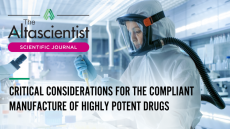BMS says outsourcing is 'a strategic function asset'
infrastructure and drug discovery strategy that it can no longer be
considered an option, according to a Bristol Myers Squibb (BMS)
senior scientist.
According to remarks made at the recent Pabord conference in London, Dr Arvind Mathur suggested that outsourcing had become so prominent within the pharmaceutical industry that it was, "becoming a strategic function asset."
The comments may come as no surprise to those in both industries as the trend for outsourcing is not new. Pharmaceutical companies have been outsourcing for just over 20 years now, in a process designed to cut down on drug development costs, which can amount to $1.3bn (€1.03bn).
Ironically, Mathur revealed that cost was no longer the dominating factor. Outsourcing has become such a specialised sector that companies are more concerned with hiring the best people for the job.
In addition, with tightening regulations and impending legislation that further scrutinise new chemical entities (NCE's) coming through the pipeline, the development of a drug that has gone through the correct channels gains even more importance.
Despite enormous investment in speed, technology and capacity, productivity in drug discovery is not increasing. In addition, current growth trends in R&D expenditure are unsustainable.
While pharma companies have generally responded by restructuring the R&D organisation, investing in technology tools and platforms, and entering into mergers and deals, an alternative and highly effective approach to the innovation deficit - outsourcing - has been gaining momentum.
For pharmaceutical firms, outsourcing enables them tap into a large pool of untapped expertise as well as ultimately proving cost effective.
This balances out with the perceived negatives that may have prevented outsourcing from being even more popular. These include a fear of loss of control over quality, protection of intellectual property, and the distance factor, which can raise shipment-related issues.
Mathur revealed that BMS currently outsource 90 per cent of its scaffold chemical structures.
"We outsource much of the non-critical intermediates, or where the in-house capacity is low," he told DrugResearcher.com
According to a report by Kalorama Information, publishing division of MarketResearch.com, global drug development spending will top $105bn (€81.5bn) by 2010 and 40 per cent of this business is expected to be dished out in outsourcing contracts - with contract research organisations (CROs) emerging triumphant.
Contract drug development spending reached $19bn in 2005 and will increase at an annual rate of 17 per cent to exceed $42bn by 2010.














